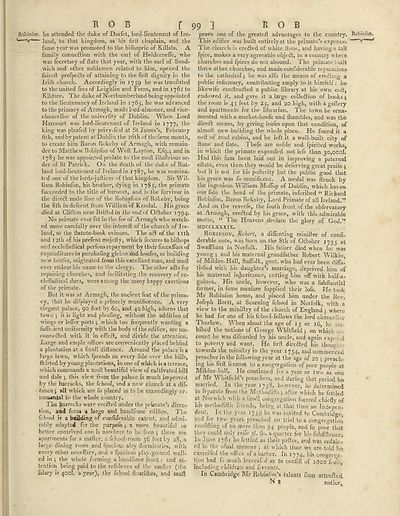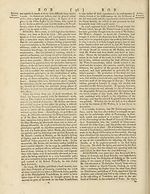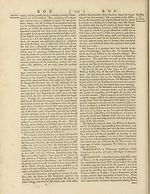Encyclopaedia Britannica, or, a Dictionary of arts, sciences, and miscellaneous literature : enlarged and improved. Illustrated with nearly six hundred engravings > Volume 18, RHI-SCR
(107) Page 99
Download files
Complete book:
Individual page:
Thumbnail gallery: Grid view | List view

ROB r 99 1 ROB
Robinfon. he attended the duke of Dorfet, lord-lieutenant of Ire-
land, to that kingdom, as his firit chaplain, and the
fame year was promoted to the bifhopric of Killala. A
family connection with the earl of Holdernefle, who
was fecretary of ftate that year, with the earl of Sand¬
wich and other noblemen related to him, opened the
faireft profpedts of attaining to the firft dignity in the
Iriih church. Accordingly in 1759 he was tranflated
to the united fees of Leighlin and Ferns, and in 1 761 to
Kildare. The duke of Northumberland being appointed
to the lieutenancy of Ireland in 1765, he was advanced
to the primacy of Armagh, made lord-almoner, and vice-
chancellor of the univerfity of Dublin. When Lord
Harcourt was lord-lieutenant of Ireland in 1777, the
king was pleafed by privy-feal at St James’s, February
6th, and by patent at Dublin the 26th of thefame month,
to create him Baron Rokeby of Armagh, with remain¬
der to Matthew Robinfon ot Weft Layton, Efq.-, and in
1 783 he was appointed prelate to the moft illuftrious or¬
der of St Patrick. On the death of the duke of Rut¬
land lord-lieutenant of Ireland in 1787, he was nomina¬
ted one of the lords-juftices of that kingdom. Sir Wil¬
liam Robinfon, his brother, dying in 1785, the primate
fucceeded to the title of baronet, and is the furvivor in
the direct male line of the Robinfons of Rokeby, being
the 8th in defcent from William of Kendal. His grace
died at Glifton nearBriftolin the end of OCtober 1794.
No primate ever fat in the fee of Armagh who watch¬
ed more carefully over theintereft of the church of Ire¬
land, as the ftatute-book evinces. The aCt of the nth
and J 2th of his prefent majefty, which fecures to biftiops
and ecclefiaftical perfons repayment by their fucceflbrs of
expenditures in purchafing glebes and houfes, or building
new honfes, originated from this excellent man, and muft
ever endear his name to the clergy. The other a£ls for
repairing churches, and facilitating the recovery of ec¬
clefiaftical dues, were among the many happy exertions
of the primate.
But it was at Armagh, the ancient feat of the prima¬
cy, that he difplayed a princely munificence. A very
elegant palace, 90 feet by 60, and 40 high, adorns that
town j it is light and pleafing, without the addition of
wings or leffer parts ; which too frequently wanting a
fufficient uniformity with the body of the edifice, are uu-
conne&ed with it in effe£t, and divide the attention.
Large and ample offices are conveniently placed behind
a plantation at a fmall diftance. Around the palace is a
large lawn, which fpreads on every fide over the hills,
Ikirted by young plantations, in one of which is a terrace,
which commands a moft beautiful view of cultivated hill
and dale ; this view from the palace is much improved
by the barracks, the fchool, and a new church at a dif.
tanee j all which are fo placed as to be exceedingly or-
naruantal to the whole country.
The barracks were erected under the primate’s direc¬
tion, and form a large and handfome edifice, The
fchool is a bnilding of confiderable extent, and admi¬
rably adapted for the purpnfe j a more beautiful or
better contrived one is nowhere to be feen j there are
apartments for a matter, a fchool-room 56 feet by 28, a
large dining room and ipaciou- airy dormitories, with
every other neceflary, and a fpacious play-ground wall¬
ed in 5 the whole forming a handfome front : and at¬
tention being paid to the refidence of the matter (the
lalary is 400I. a-year), the fchool ftoarithes, and muff
prove one of the greateft advantages to the country.
'I his edifice was built entirely at the primate’s expence.
The church is eredted of white ftone, and having a tali
fpire, makes a very agreeable objedt, in a country where
churches and fpires do not abound. The primate built
three other churches, and made confiderable reparations
to the cathedral j he was alfo the means of eredling a
public infirmary, contributing amply to it himfelf; he
likewife conftrudled a public library at his own coft^
endowed it, and gave it a large colledHon of books j
the room is 45 feet by 25, and 20 high, with a gallery
and apartments for the librarian. The town he orna¬
mented with a market-houfe and ftiambles, and was the
diredt means, by giving leafes upon that condition, of
almoft new-building the whole place. He found it a
neft of mud cabins, and he left it a well-built city of
ftone and ftate. Thefe are noble and fpirited works,
in which the primate expended not lefs than 30,000!.
Had this fum been laid out in improving a paternal
eftate, even then they would be deferving great praife j
but it is not for his porterity but the public good that
his grace was fo munificent. A medal was ftruck by
the ingenious William Moflbp of Dublin, which has on
one fide the head of the primate, inferibed “ Richard
Robinfon, Baron Rokeby, Lord Primate of all Ireland.”
And on the reverfc, the fimth front of the obfervatory
at Armagh, eredled by his grace, with this admirable
motto, “ The Heavens declare the glory of God.”
MDCCLXXXIX.
Robinson, Robert, a diflenting minifter of confi¬
derable note, was born on the 8th of October 1735 at
Swaffham in Norfolk. His father died when he was
young ; and his maternal grandfather Robert Wilkin,
of Milden-Hall, Suffolk, gent, who had ever been diffa-
tisfied with his daughter’s marriage, deprived him of
his maternal inheritance, cutting him off with half-a-
guinea. His uncle, however, who was a fubftantial
farmer, in fome meafure fupplied their lofs. He took
Mr Robinfon home, and placed him under the Rev.
Jofeph Brett, at Seaming fchool in Norfolk, with a
view to the miniftry of the church of England j where
he had for one of his fchool-fellows the lord chancellor
Thurlow. When about the age of 13 or 16, he itn
bibed the notions of George Whitfield ; on which ac¬
count he was difearded by his uncle, and again expoftd
to poverty and want. He firft directed his thoughts
towards the miniftry in the year 1754, and commenced
preacher in the following year at the age of 20 *, preach
ing his firft fermon to a congregation of poor people at
Milden-hall, He continued for a year or two as one
of Mr Whitfield’s preachers, and during that period he
married. In the year 1758, however, he determined
to feparate from the Methodifts ; after which he fettled
at Norwich with aimall congregation formed chiefly of
his methodiftic friends, being at that time an Indepen¬
dent. In the year 1759 he was invited to Cambridge,
and for twm years preached on trial to a congregation
confuting of no more than 34 people, and fo poor that
they could only raife 3I. 6*. a quarter for his fubfiflence.
In June 1761 ho fettled as their pnftor, and was ordain¬
ed in the ufual manner •, at which time we are told he;
exercifed the office of a barber. In 1774, his congrega¬
tion had fo much ineveafed as to ccnfifl of 1000 fouls,
including children and firvants.
In Cambridge Mr Robin Inn’s talents foon attrnfled.
^ * notice,.
ItobinfoM.
Robinfon. he attended the duke of Dorfet, lord-lieutenant of Ire-
land, to that kingdom, as his firit chaplain, and the
fame year was promoted to the bifhopric of Killala. A
family connection with the earl of Holdernefle, who
was fecretary of ftate that year, with the earl of Sand¬
wich and other noblemen related to him, opened the
faireft profpedts of attaining to the firft dignity in the
Iriih church. Accordingly in 1759 he was tranflated
to the united fees of Leighlin and Ferns, and in 1 761 to
Kildare. The duke of Northumberland being appointed
to the lieutenancy of Ireland in 1765, he was advanced
to the primacy of Armagh, made lord-almoner, and vice-
chancellor of the univerfity of Dublin. When Lord
Harcourt was lord-lieutenant of Ireland in 1777, the
king was pleafed by privy-feal at St James’s, February
6th, and by patent at Dublin the 26th of thefame month,
to create him Baron Rokeby of Armagh, with remain¬
der to Matthew Robinfon ot Weft Layton, Efq.-, and in
1 783 he was appointed prelate to the moft illuftrious or¬
der of St Patrick. On the death of the duke of Rut¬
land lord-lieutenant of Ireland in 1787, he was nomina¬
ted one of the lords-juftices of that kingdom. Sir Wil¬
liam Robinfon, his brother, dying in 1785, the primate
fucceeded to the title of baronet, and is the furvivor in
the direct male line of the Robinfons of Rokeby, being
the 8th in defcent from William of Kendal. His grace
died at Glifton nearBriftolin the end of OCtober 1794.
No primate ever fat in the fee of Armagh who watch¬
ed more carefully over theintereft of the church of Ire¬
land, as the ftatute-book evinces. The aCt of the nth
and J 2th of his prefent majefty, which fecures to biftiops
and ecclefiaftical perfons repayment by their fucceflbrs of
expenditures in purchafing glebes and houfes, or building
new honfes, originated from this excellent man, and muft
ever endear his name to the clergy. The other a£ls for
repairing churches, and facilitating the recovery of ec¬
clefiaftical dues, were among the many happy exertions
of the primate.
But it was at Armagh, the ancient feat of the prima¬
cy, that he difplayed a princely munificence. A very
elegant palace, 90 feet by 60, and 40 high, adorns that
town j it is light and pleafing, without the addition of
wings or leffer parts ; which too frequently wanting a
fufficient uniformity with the body of the edifice, are uu-
conne&ed with it in effe£t, and divide the attention.
Large and ample offices are conveniently placed behind
a plantation at a fmall diftance. Around the palace is a
large lawn, which fpreads on every fide over the hills,
Ikirted by young plantations, in one of which is a terrace,
which commands a moft beautiful view of cultivated hill
and dale ; this view from the palace is much improved
by the barracks, the fchool, and a new church at a dif.
tanee j all which are fo placed as to be exceedingly or-
naruantal to the whole country.
The barracks were erected under the primate’s direc¬
tion, and form a large and handfome edifice, The
fchool is a bnilding of confiderable extent, and admi¬
rably adapted for the purpnfe j a more beautiful or
better contrived one is nowhere to be feen j there are
apartments for a matter, a fchool-room 56 feet by 28, a
large dining room and ipaciou- airy dormitories, with
every other neceflary, and a fpacious play-ground wall¬
ed in 5 the whole forming a handfome front : and at¬
tention being paid to the refidence of the matter (the
lalary is 400I. a-year), the fchool ftoarithes, and muff
prove one of the greateft advantages to the country.
'I his edifice was built entirely at the primate’s expence.
The church is eredted of white ftone, and having a tali
fpire, makes a very agreeable objedt, in a country where
churches and fpires do not abound. The primate built
three other churches, and made confiderable reparations
to the cathedral j he was alfo the means of eredling a
public infirmary, contributing amply to it himfelf; he
likewife conftrudled a public library at his own coft^
endowed it, and gave it a large colledHon of books j
the room is 45 feet by 25, and 20 high, with a gallery
and apartments for the librarian. The town he orna¬
mented with a market-houfe and ftiambles, and was the
diredt means, by giving leafes upon that condition, of
almoft new-building the whole place. He found it a
neft of mud cabins, and he left it a well-built city of
ftone and ftate. Thefe are noble and fpirited works,
in which the primate expended not lefs than 30,000!.
Had this fum been laid out in improving a paternal
eftate, even then they would be deferving great praife j
but it is not for his porterity but the public good that
his grace was fo munificent. A medal was ftruck by
the ingenious William Moflbp of Dublin, which has on
one fide the head of the primate, inferibed “ Richard
Robinfon, Baron Rokeby, Lord Primate of all Ireland.”
And on the reverfc, the fimth front of the obfervatory
at Armagh, eredled by his grace, with this admirable
motto, “ The Heavens declare the glory of God.”
MDCCLXXXIX.
Robinson, Robert, a diflenting minifter of confi¬
derable note, was born on the 8th of October 1735 at
Swaffham in Norfolk. His father died when he was
young ; and his maternal grandfather Robert Wilkin,
of Milden-Hall, Suffolk, gent, who had ever been diffa-
tisfied with his daughter’s marriage, deprived him of
his maternal inheritance, cutting him off with half-a-
guinea. His uncle, however, who was a fubftantial
farmer, in fome meafure fupplied their lofs. He took
Mr Robinfon home, and placed him under the Rev.
Jofeph Brett, at Seaming fchool in Norfolk, with a
view to the miniftry of the church of England j where
he had for one of his fchool-fellows the lord chancellor
Thurlow. When about the age of 13 or 16, he itn
bibed the notions of George Whitfield ; on which ac¬
count he was difearded by his uncle, and again expoftd
to poverty and want. He firft directed his thoughts
towards the miniftry in the year 1754, and commenced
preacher in the following year at the age of 20 *, preach
ing his firft fermon to a congregation of poor people at
Milden-hall, He continued for a year or two as one
of Mr Whitfield’s preachers, and during that period he
married. In the year 1758, however, he determined
to feparate from the Methodifts ; after which he fettled
at Norwich with aimall congregation formed chiefly of
his methodiftic friends, being at that time an Indepen¬
dent. In the year 1759 he was invited to Cambridge,
and for twm years preached on trial to a congregation
confuting of no more than 34 people, and fo poor that
they could only raife 3I. 6*. a quarter for his fubfiflence.
In June 1761 ho fettled as their pnftor, and was ordain¬
ed in the ufual manner •, at which time we are told he;
exercifed the office of a barber. In 1774, his congrega¬
tion had fo much ineveafed as to ccnfifl of 1000 fouls,
including children and firvants.
In Cambridge Mr Robin Inn’s talents foon attrnfled.
^ * notice,.
ItobinfoM.
Set display mode to:
![]() Universal Viewer |
Universal Viewer | ![]() Mirador |
Large image | Transcription
Mirador |
Large image | Transcription
Images and transcriptions on this page, including medium image downloads, may be used under the Creative Commons Attribution 4.0 International Licence unless otherwise stated. ![]()
| Permanent URL | https://digital.nls.uk/193020098 |
|---|
| Attribution and copyright: |
|
|---|
| Description | Ten editions of 'Encyclopaedia Britannica', issued from 1768-1903, in 231 volumes. Originally issued in 100 weekly parts (3 volumes) between 1768 and 1771 by publishers: Colin Macfarquhar and Andrew Bell (Edinburgh); editor: William Smellie: engraver: Andrew Bell. Expanded editions in the 19th century featured more volumes and contributions from leading experts in their fields. Managed and published in Edinburgh up to the 9th edition (25 volumes, from 1875-1889); the 10th edition (1902-1903) re-issued the 9th edition, with 11 supplementary volumes. |
|---|---|
| Additional NLS resources: |
|

